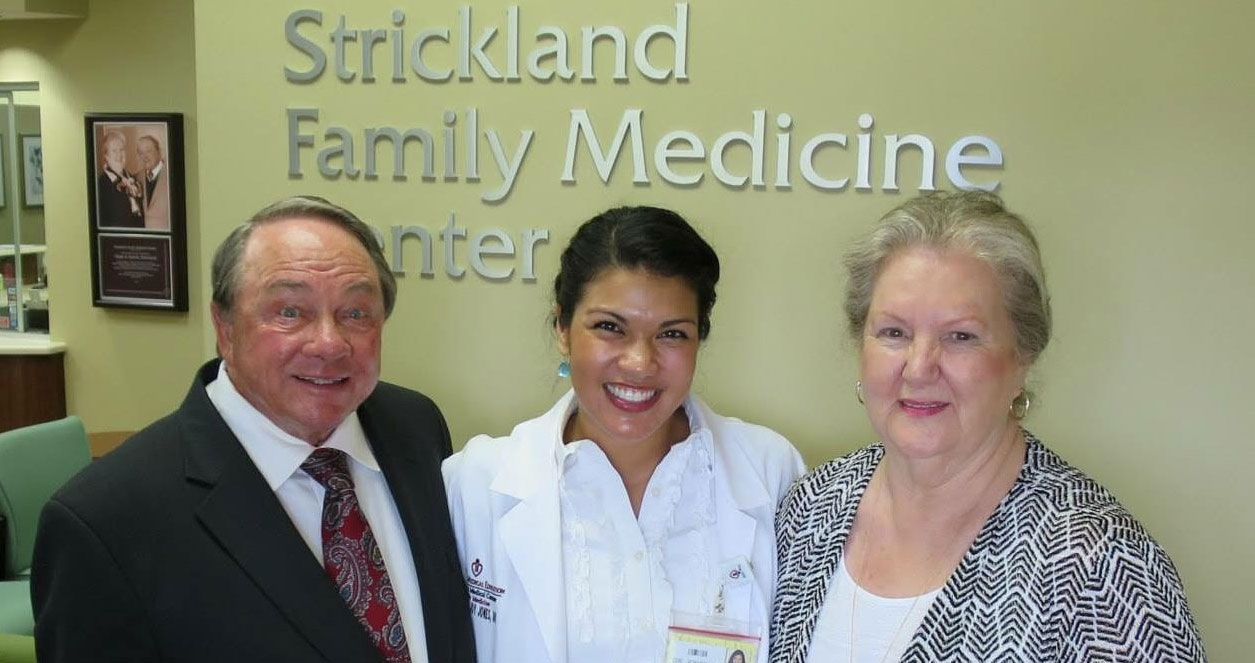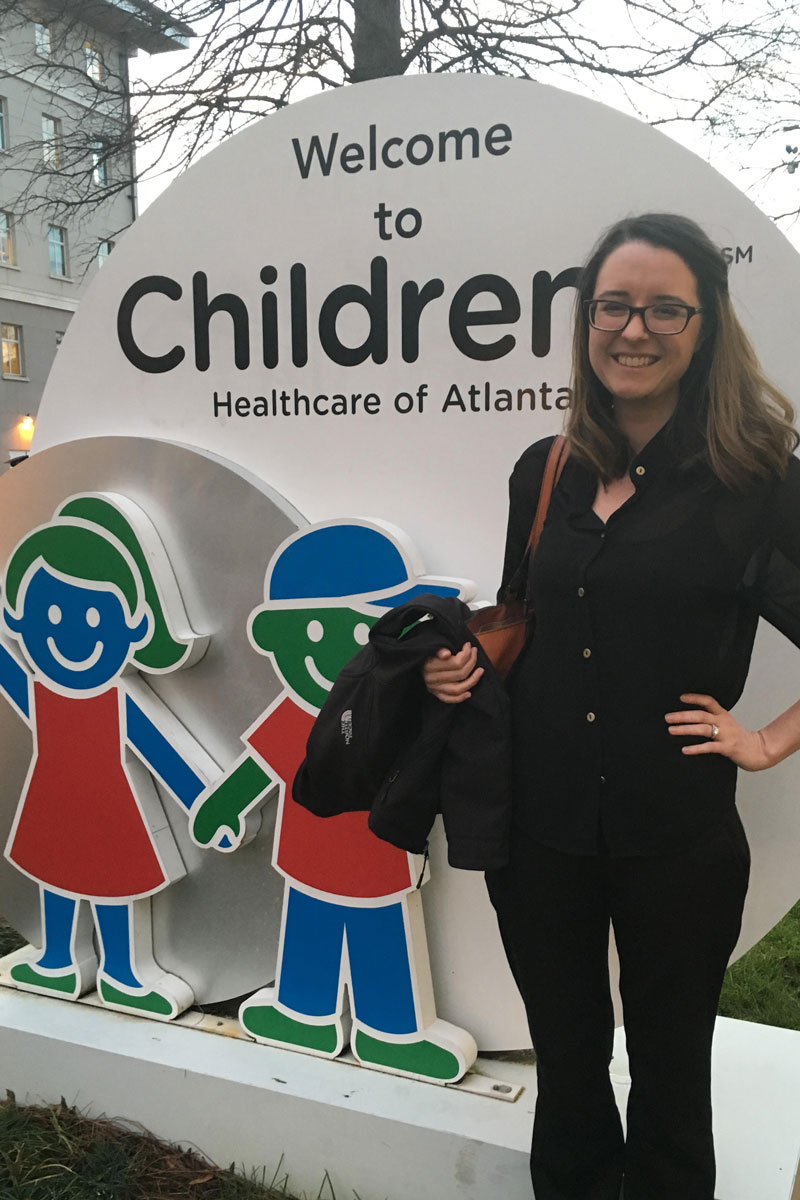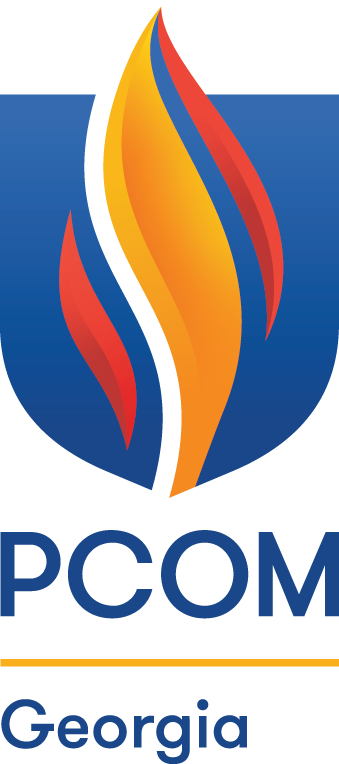Making the Match
February 3, 2016
Philanthropists Clyde and Sandra Strickland are pictured at the Strickland Family
Medicine Center with Dr. Barbara Joy Jones, a GA-PCOM alum who matched two years ago.
Match Day is an annual rite of passage for medical students, a day when they find
out at which United States residency program they will train for the next three to
seven years. “Daunting to any fourth year medical student,” said Barbara Joy Jones,
DO ’14 who matched two years ago.
DOs and MDs must complete these graduate medical education (GME) programs or “residencies” in order to become licensed physicians. It’s during their
fourth and final year of medical school (whether seeking a DO or MD degree) when students
choose specialties and begin applying to residency programs throughout the country—that’s
where the Match comes in. Likewise, fourth-year pharmacy students have the option
to continue their training by matching to a residency program.
Currently, there are two Match systems for physicians: the American Osteopathic Association’s
(AOA) National Matching Service and the National Resident Matching Program (NRMP).
The AOA National Matching Service provides a mechanism for matching the preferences
of applicants for U.S. residency positions with the preferences of residency program
directors, but only for osteopathic candidates. Similarly, the NRMP matches the preferences
of applicants to the preferences of program directors, but both osteopathic (DO) and
allopathic (MD) candidates can apply to programs represented by the NRMP.
Among students at Georgia Campus – Philadelphia College of Osteopathic Medicine, which
is the only osteopathic medical school in Georgia, some candidates choose to use the AOA National Matching Service, others choose to
use the allopathic matching program (the NRMP), and still others work with both services
to try to match with their ideal program. “I myself had questions about the Match—where
would I go, would I even match at all, would I like it there ... Should I enter the
DO Match, MD Match or both? This takes strategy,” Dr. Jones, a GA-PCOM alum, explained.
The Match processes go like this: Students apply to the programs they’re interested
in, and program leaders and current residents interview candidates. Later, applicants
rank preferred programs and program directors rank candidates and indicate the number
of program spots available. “I only ranked programs that I would truly be happy at,”
Dr. Jones said, “I decided on my number one choice because it was a place that comprised
all I was looking for—a big hospital with diverse pathology, amazing location, fantastic
faculty, a chance to set the foundation and be a trail blazer, and it was a dually-accredited
program in which I could take DO and MD boards and not be denied practicing medicine
anyplace in the USA.”
The numbers go into a computer system that matches students to residencies based off
rankings and available spots—it is a double-blinded process, meaning that neither
the programs nor the medical students know their match until they are revealed on
Match Day.
Fourth-year pharmacy students go through a matching process—the American Society of
Health-System Pharmacists (ASHP) Resident Matching Program, which includes both postgraduate
year one (PGY1) and postgraduate year two (PGY2) pharmacy residencies—though their
decision to pursue a residency usually depends on whether they seek a clinical or
retail-based pharmaceutical path.
 Katie Bozman (pictured left), PharmD ’15 and alum of the Suwanee campus’ School of Pharmacy, matched just last year with a PGY1 pharmacy residency at Children’s Healthcare of Atlanta. Planning to work with children, she knew she wanted to participate in a pediatric
hospital residency.
Katie Bozman (pictured left), PharmD ’15 and alum of the Suwanee campus’ School of Pharmacy, matched just last year with a PGY1 pharmacy residency at Children’s Healthcare of Atlanta. Planning to work with children, she knew she wanted to participate in a pediatric
hospital residency.
“I wasn’t quite sure how to rank going into the Match, but I felt connected to Children’s
Healthcare. You can tell pretty quickly if a place is going to fit,” Dr. Bozman said
and added, “Interviewing was very eye-opening and it changed how I felt about what
I wanted in a residency program.”
Currently helping run the pharmacy portion of the pediatric heart failure clinic and
the teen heart transplant clinic, Dr. Bozman helps educate young patients and their
families on their medication regimens, among other duties. Her experiences with the
residency so far have challenged her and showed her there are many areas of pharmacy
where she can find success, she said.
This year, the AOA National Matching Service results will be released February 8 while
the NRMP and the ASHP Matching Program results come out March 18. However, the Accreditation
Council for Graduate Medical Education (ACGME) plans to combine the two medical Match
processes, resulting in a single accreditation system for graduate medical education
by 2020.
But what of those who do not get a match? With the AOA National Matching Service,
participants will find out whether or not and where they’ve matched on February 8.
During the remainder of the week known as the “scramble,” unmatched applicants are
made aware of open positions and vice versa, so participants may reach out to schedule
new interviews and make a match. With the NRMP program, applicants find out whether
they’ve matched four days before Match Day. If there’s not a match, these students
may participate in the Supplemental Offer and Acceptance Program (SOAP) to work to
obtain an unfilled residency position. SOAP participants apply to open residencies,
express their preferences, and—after program directors create a preference list of
these applicants—are offered positions in a series of rounds based on new rankings.
They have until 5 p.m. on the day before Match Day to make a match.
“As far as interviews go—take a deep breath, keep a smile on your face and remember
they are as excited to meet you as you are to meet them, and you’ve already made it
so far,” Dr. Bozman advises to future match candidates, “As far as waiting for Match
day—it will come, it seems like the longest two weeks of your life, but try not to
obsess because it will happen, it just takes time. It’s a great time to focus on your
current rotation, and no matter what happens, you will have opportunities.”
Dr. Jones remembers tossing and turning the night before Match Day, and then at 9:12
a.m. on Match Day, it was confirmed that she matched with her first choice of programs,
Gwinnett Medical Center's Family Medicine Residency: “So of course the next step is
to get on Facebook to share the news, as well as read all my colleagues' statuses
as their emails came in. What a day of excitement, relief, happiness, and anticipation
for the journey ahead.
| |
Match Day by Barbara Joy Jones
"Match Day" the word is daunting to any 4th medical school student. It's one day,
one decision that dictates where you will be for the next 3+ years. I myself had questions
about match-- where would I go, would I even match at all, would I like it there?
Being a DO medical student there was even MORE to think about. Should I enter DO match,
MD match or both. This takes strategy!
My Journey:
I sent out 12 applications to DO, MD and dually accredited programs. I was invited
to 11 interviews. I accepted and scheduled 7. By the end of interview season I cancelled
the 7th. Why? So expensive, so exhausting and I had already interviewed at my top
choices.
By the time ranking came around, I did decide to go into DO match (with MD match as
a back up) I only ranked programs that I would truly be happy at. NEVER rank a place
you would be unhappy at, just to have a backup. If you actually rank a program, there's
always a possibility of going there. I had decided on my #1 choice. It was a program
that was comprised of all I was looking for--big hospital with diverse pathology,
amazing location, fantastic faculty, a chance to set the foundation and be a trail
blazer, it was a dually accredited program in which I could take DO and MD boards
and not be denied practicing medicine anyplace in the USA.
There were a few programs going into match that I knew really wanted me, because they
courted me. The program directors either emailed or called me personally. (NB: they
cannot tell you that they ranked you high, but they can say sweet things like "It
would be great to work with you! You would be a great addition to our program.") This
shows me that even though we THINK Match is random, it's really not. Using people
skills, you can discern if a program is going to rank you and rank you high at that.
If you like a program, then you show huge interest and they reciprocate, you have
a good chance. After ranking, you wait and wait and wait until Match Day! Oh the agony!!
The night before Match I tossed and turned in anticipation, all of medical school
comes together for this crucial moment. On Match Day, I awoke at 7am, they claim that
all emails will go out at noon. I have to wait 5 hours?! Yeh right, I was checking
my school email every 10 minutes and at 9:12am, an email came through that confirmed
that I got my #1 choice!!!! Gwinnett Medical Center's Family Medicine Residency. So
of course the next step is to get on Facebook to share the news. As well as read all
my colleagues' statuses as their emails came in. What a day of excitement, relief,
happiness and anticipation for the journey ahead. Class of 2016, I pray you all have
just as awesome of an experience as I did. May the odds ever be in your favor. I'm
so proud of y'all.
|
|
About PCOM Georgia
PCOM Georgia has been serving students and the community for 20 years as a branch campus of Philadelphia
College of Osteopathic Medicine (PCOM), a private, not-for-profit, accredited institution
of higher education established in 1899. Located in Suwanee (Gwinnett County), PCOM
Georgia offers doctoral degrees in osteopathic medicine, pharmacy and physical therapy.
Graduate degrees are offered in biomedical sciences, medical laboratory science and
physician assistant studies. The campus joins PCOM South Georgia in Moultrie in helping
to meet the healthcare needs of the state. Emphasizing "a whole person" approach to
care, PCOM Georgia focuses on educational excellence, interprofessional education
and service to the community. For more information, visit pcom.edu or call 678-225-7500. The campus is also home to the Georgia Osteopathic Care Center,
an osteopathic manipulative medicine clinic, which is open to the public by appointment.
For more information, visit pcomgeorgiahealth.org.
Contact Us
For general media inquiries, please contact the Office of Marketing and Communications
at 215-871-6300 or communications@pcom.edu. Visit our media relations page to view contact information for public relations personnel.
Connect with PCOM Georgia


 Katie Bozman (pictured left), PharmD ’15 and alum of the Suwanee campus’
Katie Bozman (pictured left), PharmD ’15 and alum of the Suwanee campus’ 